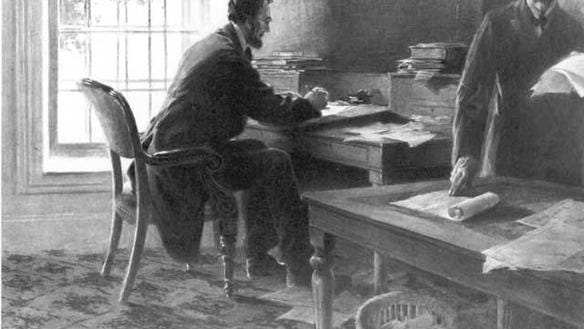What Abe Lincoln and the Telegraph Have in Common with A.I.
Fear can prevent progress and benefits. Risks have to be taken.
What Abe Lincoln and the Telegraph Have in Common with Artificial Intelligence
by Tom Madden, founder and CEO at TransMedia Group
Sept. 16, 2024
For those who fear AI could one day become a technology tyrant taking control of us human beings, you had just as concerned counterparts in the mid 1800’s.
Americans then were just as alarmed by a new, frightening phenomenon--electricity.
In the 1850’s, many believed a ferocious evil cat had been let out of a dark bag that would go on to savagely hunt and ultimately devour humanity. For where it was let loose, the United States, it would almost certainly be doomsday.
People then found the idea beyond grasp that you can send messages by electric sparks. That was sheer insanity. Some preachers saw it as “evil incarnate.” Dark, to say the least.
What we need today is what America was fortunate to have then, a bright person as president, who was not just clever, but curious, with a yen for adventure and an urge to take charge. He was a genuine early adopter named Abraham Lincoln.
And he couldn’t have become president at a more propitious time, 1861.
Lincoln didn’t just free the slaves, he set our communications free via an invention called the telegraph. Right away created the Military Telegraph Corp in 1862.
Thereafter, practically every day during the Civil War he would read the telegraphs Union Army generals would send to their headquarters, often chiming in, encouraging more chutzpah in fighting General Robert E. Lee.
Thus, Lincoln became the first political figure to rule the U.S. Military, assuming the title of Commander in Chief, all due to the telegraph, thanks to a phenomenon called sparks.
Today there are new worries sparking concern.
Attorney General Merrick Garland believes AI is enabling undercover illegal activities such as price fixing rents. According to Garland, the technology "enables landlords to share confidential, competitively sensitive information and align their rents," which the DOJ alleges is a violation of the Sherman Antitrust Act.
And there are other tech concerns sparking their way to courtrooms.
It seems with every technological advancement, with the rewards always come risks requiring our leaders to be sharper, more curious and more alert like Lincoln.
Tom Madden is CEO of the public relations firm, TransMedia Group, which he founded when he left NBC. He is an author of six books and highly recommends Tom Wheeler’s, “Mr. Lincoln’s T-Mails,” which inspired this column. Madden’s latest book is Planetary Lifeguard, Blowing the Whistle on Climate Change.





